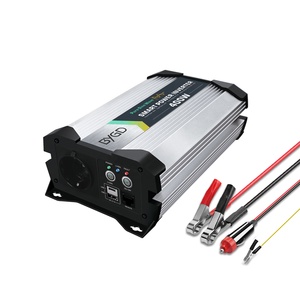Home inverters are electrical devices that convert direct current (DC) power from sources such as batteries, solar panels, or fuel cells into alternating current (AC) power for home use. Also, they power appliances, lights, and other electrical equipment in off-grid or emergency power situations. A power inverter for a home also regulates the power supply and increases electrical device efficiency.
Types of Home Inverters
There are different home inverters with unique capabilities, costs, and conveniences. An inverter battery for a home is a battery-based option that can power small and large appliances such as air conditioners and refrigerators. These inverters store energy from a battery and then step up the voltage for home applications. A home depot inverter is a relatively cheap option and easy to install. As a result, it's an ideal choice for those looking to save money on electricity bills. Home Depot inverters come in various sizes and designs. Their features are compatible with most appliances, including air conditioners and basic electronics. An off-grid solar inverter converts energy from the sun into electricity for home use. They are ideal for those living in areas without grid access as they are easy to install and need no extra wiring. An off-grid solar inverter for a house is also very efficient, allowing homeowners to maximize the efficiency of their solar system. A solar power inverter for a home generates electricity from solar panels to power home appliances and electronics. In addition, a solar inverter for a home is available in different types, sizes, and features. Smaller, less powerful inverters usually provide energy to small, low-power house appliances such as air conditioners and heaters.
How to Choose the Best Power Inverter for Home
The best power inverter for a home is energy efficient and meets specific power needs. When choosing the best inverter for a home, look for models that offer overload protection. Also, look for ones with low harmonic distortion, extended run-time, and automatic line regulation. In addition, an inverter with higher wattage with many outlets is ideal for connecting several household appliances. Remember to read the specifications to determine the compatibility of the inverter with home electrical devices.


































 浙公网安备 33010002000092号
浙公网安备 33010002000092号 浙B2-20120091-4
浙B2-20120091-4